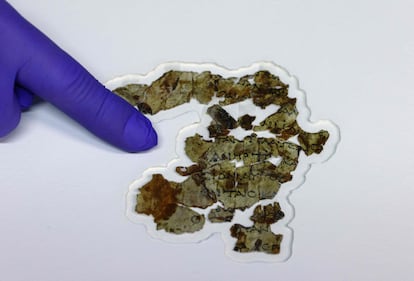New fragments of Dead Sea Scrolls found for the first time in 60 years
Israeli archeologists locate 2,000-year-old remains of hidden biblical texts, along with a child’s preserved skeleton and a 10,500-year-old basket


Israeli archeologists’ presentation this week of dozens of Dead Sea Scroll fragments is the first of its kind in six decades. The researchers also found a 6,000-year-old naturally mummified skeleton of a child and an intact woven basket thought to be 10,500 years old.
The 2,000-year old fragments of parchment are from the Book of the Twelve Minor Prophets, including the books of Zechariah and Nahum. Written in Greek, they match a scroll discovered about 60 years ago. One fragment read: “These are the things you are to do: Speak the truth to one another, render true and perfect justice in your gates. And do not contrive evil against one another, and do not love perjury, because all those are things that I hate – declares the Lord,” according to a translation offered by the daily Haaretz.
Archeologists had to rappel down as much as 80 meters to the cave in Qumran, in the Judean desert, where they unearthed the items during a survey of more than 100 km of cliffs and caves that required the use of drones.
These are the things you are to do: Speak the truth to one another, render true and perfect justice in your gatesPassage from the newly found fragments of the Dead Sea Scrolls
The new fragments of manuscript, the skeleton and basket were found in the “Cave of Horror”, where previously 1,900-year-old skeletons of 40 men, women and children were found. “These are new pieces of the puzzle and we can add them to our greater picture of the period and of the text,” Oren Ableman of the Israel Antiquities Authority’s (IAA) Dead Sea Scrolls Unit told the Reuters news agency.
The original Dead Sea Scrolls were found between 1947 and 1956 by local Bedouin in the caves of Qumran, about 20 km east of Jerusalem. Those texts included sections of the Hebrew bible 1,000 years older than any previously known copy. A 1961 excavation of the Cave of Horror found previous parchment fragments but nothing had been found since then.
Israeli archaeologists excavated in the West Bank, in Palestinian territory occupied since 1967, acting on fears that looters were aiming to find such items and put them on the antiquities black market. Crews also employed drones to map hundreds of caves, only fully excavating a select few.
The new fragments are believed to belong to a scroll hidden in the cave during the Bar Kochba Revolt, an armed Jewish uprising against Rome in the 2nd Century AD. “We found a textual difference that has no parallel with any other manuscript, either in Hebrew or in Greek,” said Ableman, showing how the texts evolved with the linguistic environment of the time.
Of the nearly 1,000 Dead Sea Scrolls recovered so far, only three are relatively complete. Researchers claim that this new discovery will allow them to revise the history of the Greek translations of the Bible, which were then translated into Latin and modern languages.
Archaeological discoveries often generate disputes between Israel and the Palestinian Authority. International law prohibits Israel from removing cultural property from occupied territory.
A cache of rare 1,900-year-old coins from the period of the Jewish revolt was also found in the Cave of Horrors, confirming the past presence of Jewish people in the Jordan Valley, where many families took refuge after the siege of Jerusalem by the Romans in 70 AD.
Researchers still do not know the characteristics of the Jewish sect that took refuge in the Dead Sea almost 20 centuries ago and bequeathed to humanity the first biblical texts preserved until today. The remains found in the Cave of Horrors are not marked by signs of violence, which leads them to believe that Roman troops led a siege until those inside died of starvation.
The Dead Sea Scrolls, largely written in Aramaic and Hebrew, were recovered in 11 of the nearly 300 caves surveyed at Qumran. Archeologists, theologians, linguists and paleographers have been sorting and piecing fragments together for more than 70 years.
Tu suscripción se está usando en otro dispositivo
¿Quieres añadir otro usuario a tu suscripción?
Si continúas leyendo en este dispositivo, no se podrá leer en el otro.
FlechaTu suscripción se está usando en otro dispositivo y solo puedes acceder a EL PAÍS desde un dispositivo a la vez.
Si quieres compartir tu cuenta, cambia tu suscripción a la modalidad Premium, así podrás añadir otro usuario. Cada uno accederá con su propia cuenta de email, lo que os permitirá personalizar vuestra experiencia en EL PAÍS.
¿Tienes una suscripción de empresa? Accede aquí para contratar más cuentas.
En el caso de no saber quién está usando tu cuenta, te recomendamos cambiar tu contraseña aquí.
Si decides continuar compartiendo tu cuenta, este mensaje se mostrará en tu dispositivo y en el de la otra persona que está usando tu cuenta de forma indefinida, afectando a tu experiencia de lectura. Puedes consultar aquí los términos y condiciones de la suscripción digital.








































